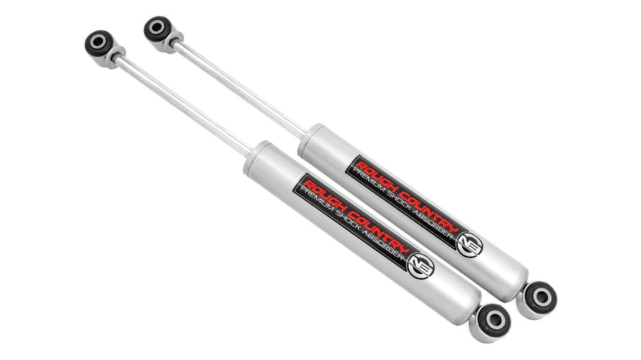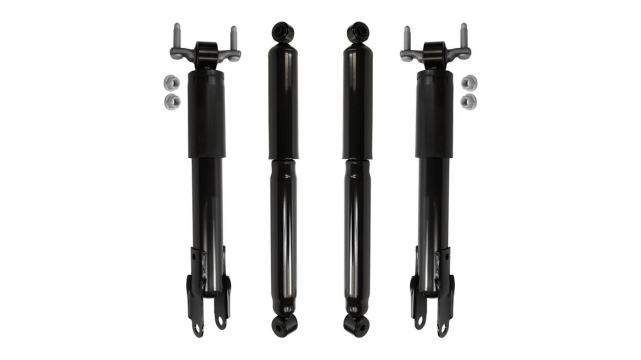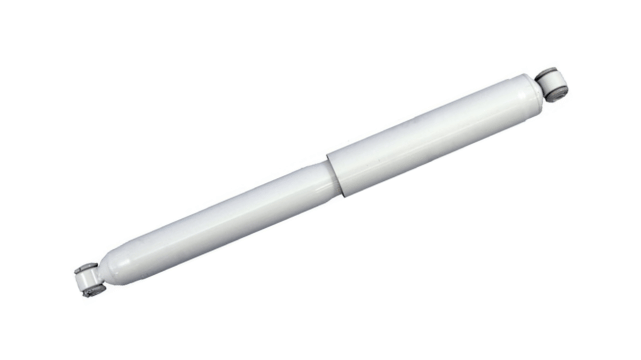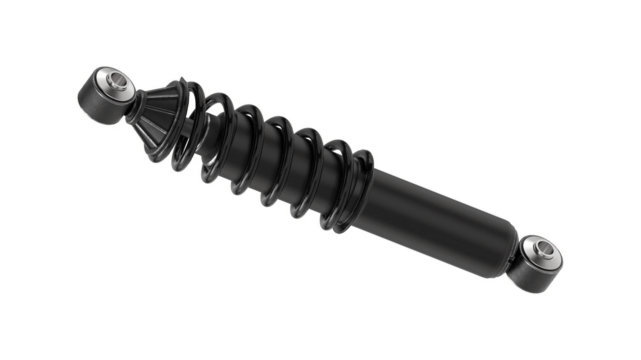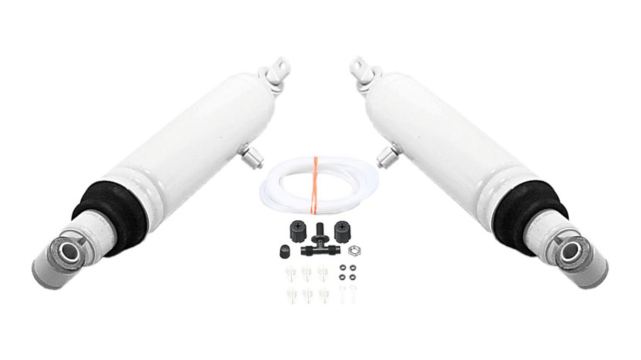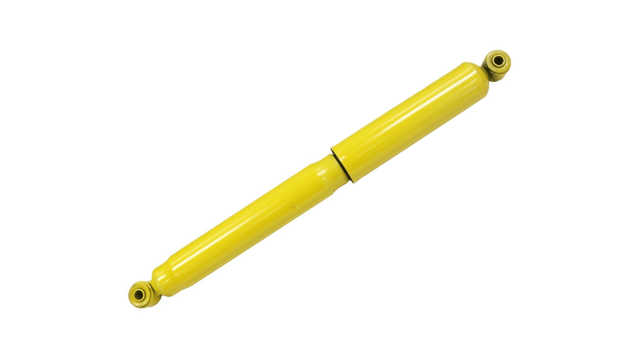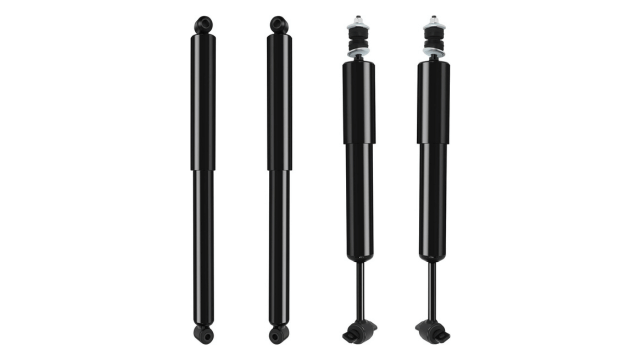Shock absorbers are critical components in every vehicle, ensuring safety, comfort, and proper handling. These devices control the movement of the vehicle’s suspension, preventing excessive bouncing and keeping the tires in contact with the road. This directly impacts your driving experience, from smoothness on highways to control during sharp turns.
Selecting the right shock absorber is essential for a safe and comfortable ride. The correct shocks ensure optimal vehicle stability, reduce wear on your tires, and enhance overall driving performance. However, finding the best shock absorbers can be confusing due to the wide variety of types available. The choice often depends on your vehicle type, driving habits, and performance needs.
This guide will break down the various types, features, and considerations you should weigh before purchasing, helping you make an informed decision for your car, truck, or SUV.
Best Shock Absorbers Buying Guide
Understanding Shock Absorbers
What are Shock Absorbers?
Shock absorbers, also known as dampers, play a vital role in managing the movement of your vehicle’s suspension. They are designed to control the rebound and compression movements caused by road irregularities, keeping the vehicle stable by reducing excessive bouncing. Without them, every bump or dip would cause significant discomfort and make controlling the vehicle difficult.
The primary function of a shock absorber is to absorb the kinetic energy from road bumps and convert it into heat, which is then dissipated. This ensures that the tires remain in contact with the road, providing better control, enhanced handling, and improved braking. Shock absorbers contribute significantly to your vehicle’s safety by reducing body roll, sway, and excessive dive during braking or acceleration.
Types of Shock Absorbers
Twin-Tube Shocks
Twin-tube shock absorbers are the most common type found in everyday vehicles. They consist of two cylinders: an inner cylinder that houses the piston and fluid and an outer cylinder that stores excess hydraulic fluid. These shocks offer a smooth and comfortable ride, making them ideal for most passenger cars and light trucks. Twin-tube shocks are affordable and provide reliable performance for regular driving conditions. However, they may not perform as well under high stress or extreme driving conditions compared to other types.
Mono-Tube Shocks
Mono-tube shocks are designed for higher performance vehicles. Unlike twin-tube shocks, they feature a single tube where the piston moves. This design allows for better heat dissipation and improved handling. Mono-tube shocks are more responsive and offer superior damping, making them a popular choice for sports cars and off-road vehicles. They are more expensive than twin-tube shocks but provide better performance, particularly in demanding conditions where greater control and stability are required.
Gas-Charged Shocks
Gas-charged shocks add pressurized nitrogen gas to the oil-filled chamber, which helps reduce foaming and ensures consistent damping performance. These shocks are ideal for vehicles that require improved handling and stability, especially under high-speed or rough terrain conditions. Gas-charged shocks offer better control compared to hydraulic shocks, making them a popular choice for performance-focused vehicles.
Coilover Shocks
Coilover shocks are a specialized type of shock absorber that incorporates a coil spring over the damper. They are commonly used in racing and off-road vehicles where precise suspension tuning is required. Coilovers provide excellent adjustability, allowing drivers to fine-tune ride height, handling, and stiffness according to specific driving needs.
Key Features to Consider When Buying Shock Absorbers
Compatibility with Your Vehicle
The first and most crucial consideration when buying shock absorbers is ensuring they are compatible with your vehicle. Each vehicle model has specific suspension and damping requirements, which means not all shocks will fit or function correctly. Check your vehicle’s manual or consult a professional mechanic to determine the appropriate shock absorber type and size for your car, truck, or SUV. Incompatibility can lead to reduced performance, poor handling, and even damage to your suspension system.
Durability and Material Quality
Shock absorbers endure significant stress from road conditions, so choosing durable, high-quality materials is essential. Look for shocks made from high-strength materials like steel or aluminum that resist wear and corrosion. The longevity of your shock absorbers will depend on their build quality and resistance to external elements like water, dirt, and salt. Investing in durable shocks can save you money in the long run by reducing the need for frequent replacements and repairs.
Ride Comfort and Handling Performance
Different shock absorbers offer varying levels of ride comfort and handling. If you prioritize a smooth, comfortable ride, opt for shocks designed for comfort, like twin-tube or hydraulic shocks. For those seeking performance, especially in sports cars or off-road vehicles, performance shocks such as mono-tube or gas-charged shocks will deliver better control and handling during aggressive driving or on rough terrain. Your choice of shocks should match your driving preferences and the typical conditions you encounter.
Adjustability
Some shock absorbers come with adjustable settings, allowing you to fine-tune the ride characteristics to your preferences. Adjustable shocks offer the flexibility to switch between softer damping for comfort and firmer settings for performance driving. This is particularly useful for vehicles used in different environments, such as daily driving and occasional off-roading. Although adjustable shocks are more expensive, they provide greater control over your vehicle’s suspension performance.
Price vs. Performance
When selecting shock absorbers, it’s important to balance price with performance. High-end shocks may offer superior features like better damping, improved heat dissipation, and longer lifespans, but they come with a higher price tag. Budget shocks may be suitable for everyday driving, but they may lack durability or advanced features needed for more demanding conditions. Evaluate your driving needs and budget to choose the best option that provides value without compromising performance.
Types of Vehicles and Their Shock Absorber Needs
Passenger Cars
For passenger cars, shock absorbers that prioritize comfort and smoothness are essential. Most sedans and compact cars come equipped with twin-tube or hydraulic shocks that provide adequate damping for city driving and highway cruising. These shocks offer a balance between cost and comfort, ensuring a pleasant ride for drivers and passengers alike. Unless you have specific performance requirements, basic twin-tube or gas-charged shocks will suffice for most passenger cars.
SUVs and Trucks
SUVs and trucks require shock absorbers designed to handle heavier loads and more demanding driving conditions. If you regularly drive off-road or tow heavy loads, it’s essential to choose heavy-duty shock absorbers that offer enhanced durability and stability. Gas-charged or mono-tube shocks are commonly used for SUVs and trucks due to their superior performance in tough conditions. These shocks provide better control and handling, especially when dealing with uneven terrain or carrying heavy cargo.
Sports Cars and High-Performance Vehicles
For sports cars and performance vehicles, shock absorbers that deliver enhanced handling, cornering, and stability are critical. Mono-tube and coilover shocks are popular options for these vehicles, as they offer better control and adjustability. High-performance shocks are designed to handle higher speeds and sharper turns, making them ideal for drivers who want to maximize their vehicle’s potential on the road or track.
Off-Road and All-Terrain Vehicles
Off-road and all-terrain vehicles require shock absorbers that can withstand the rigors of rugged landscapes. Coilover shocks or heavy-duty gas-charged shocks are ideal for these vehicles, as they provide the necessary durability and flexibility to handle dirt, gravel, and uneven surfaces. These shocks are built to endure extreme conditions, offering better protection and performance in harsh environments.
Shock Absorber Technologies
Hydraulic vs. Gas-Charged Shock Absorbers
Hydraulic shock absorbers use hydraulic fluid to absorb energy and dampen the vehicle’s movement. While effective for most driving conditions, hydraulic shocks can suffer from aeration, where air bubbles form in the fluid, reducing their efficiency. Gas-charged shocks, on the other hand, pressurize the hydraulic fluid with nitrogen gas, preventing aeration and providing more consistent damping. Gas-charged shocks are particularly beneficial for high-speed driving or rough terrains, offering better control and stability than hydraulic models.
Adjustable vs. Non-Adjustable Shocks
Adjustable shock absorbers allow drivers to modify the damping settings based on driving conditions. This feature is particularly useful for vehicles that experience varying road conditions or for drivers who want to switch between comfort and performance settings. Non-adjustable shocks, while simpler and more affordable, do not offer this flexibility. For most everyday driving, non-adjustable shocks provide sufficient performance, but for those seeking more control, adjustable shocks are worth the investment.
Electronic Suspension Systems
Some high-end vehicles come equipped with electronic suspension systems, where shock absorbers are controlled electronically to adjust damping in real-time. These systems use sensors to monitor road conditions and driving style, automatically adapting the shock absorber settings for optimal performance. While expensive, electronic suspension systems offer unparalleled comfort and performance, making them a popular choice for luxury vehicles and performance cars.
Innovations in Shock Absorber Design
Shock absorber technology has seen several advancements in recent years, including adaptive damping systems and self-adjusting shocks. These innovations improve comfort, safety, and handling by automatically adjusting shock settings to match driving conditions, ensuring a smooth ride in any environment.
How to Choose Shock Absorbers Based on Driving Conditions
City Driving
For city driving, comfort and smoothness are the top priorities. Twin-tube shocks or standard hydraulic shocks provide excellent ride comfort for stop-and-go traffic and paved roads. City drivers typically don’t need heavy-duty or performance-oriented shocks unless they frequently encounter poor road conditions or potholes. For regular urban use, opt for shock absorbers designed to provide a balance between comfort and cost-efficiency.
Off-Road Driving
Off-road driving places unique demands on your vehicle’s suspension, requiring shocks that can handle rough and uneven terrain. Mono-tube or coilover shocks with superior durability and responsiveness are ideal for off-roading. These shocks provide better handling and stability, even when tackling mud, sand, or rocky landscapes. Investing in heavy-duty off-road shocks can significantly improve your vehicle’s performance and protect it from damage caused by challenging conditions.
High-Speed Highway Driving
For highway driving at high speeds, shock absorbers need to provide excellent control and stability. Gas-charged or mono-tube shocks are well-suited for these conditions, offering improved handling and reduced body roll during fast maneuvers. Stability is crucial at high speeds, and performance shocks will help maintain control while reducing driver fatigue during long journeys. If you frequently drive on highways, upgrading to high-performance shocks is a wise choice.
Towing and Hauling
Vehicles that regularly tow or carry heavy loads require shock absorbers that can handle the additional weight without compromising performance. Heavy-duty gas-charged shocks or specialized towing shocks are ideal for trucks and SUVs used for towing trailers or carrying large cargo. These shocks are designed to reduce sagging and improve stability, ensuring the vehicle remains balanced even under heavy loads. Investing in shocks specifically designed for towing can prevent excessive wear on your vehicle’s suspension and improve overall safety.
Installation and Maintenance Tips
Installation of Shock Absorbers
Installing shock absorbers can be a DIY project for those with mechanical knowledge, but it’s often recommended to have a professional handle the installation to ensure everything is done correctly. Shock absorbers are integral to your vehicle’s suspension system, and improper installation can lead to reduced performance, uneven tire wear, or even damage to the vehicle. If you’re confident in your skills, follow the manufacturer’s guidelines and use the correct tools for the job. Remember to replace shocks in pairs to maintain balanced handling.
Maintenance and Replacement
Shock absorbers wear out over time, and regular maintenance is key to prolonging their lifespan. It’s essential to inspect your shocks for signs of wear, such as oil leaks, uneven tire wear, or excessive bouncing. Generally, shock absorbers should be replaced every 50,000 to 100,000 miles, depending on your driving habits and the road conditions you encounter. If you notice your vehicle handling differently, or if you experience more body roll, it may be time for a replacement.
Regular maintenance also includes checking for corrosion or damage to the shock absorber mounts, ensuring they are securely fastened. Keeping your shocks in good condition will improve your vehicle’s performance, safety, and comfort.
Conclusion and Final Verdict
Choosing the best shock absorbers for your vehicle requires a balance of performance, comfort, and durability. Whether you need shocks for everyday city driving, off-roading, towing, or high-speed performance, understanding the different types and features available will help you make the right decision. Investing in high-quality shock absorbers not only improves your driving experience but also enhances the overall safety and longevity of your vehicle.
Always consider your driving habits, vehicle type, and typical road conditions when selecting shock absorbers. By following this guide, you’ll be equipped to choose the best shock absorbers that match your needs, ensuring a smoother, safer ride for years to come.

